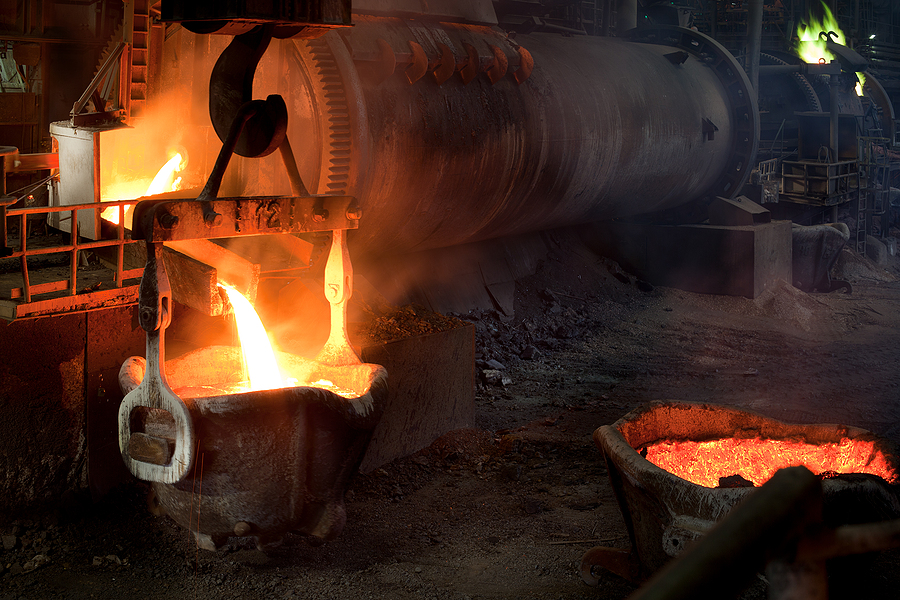
A Substantial Investment
Moving ahead “at full steam,” Aurubis has allocated an extra $276 million to double the capacities of its secondary smelting facility in Georgia.
The German-based metals firm announced its decision to invest 640 million euros ($707 million) to construct the smelter in Augusta, Ga. With a planned upgrade, resulting in an additional recycling module, this site will have an estimated capacity of 180,000 tons per annum.
When construction began in mid-2022, it was projected that 300 million euros ($331 million) would be required to complete the project, which was originally designed to process up to 90,000 tons per year.
Aurubis Partners with SMS Group
After a thorough deliberation in December, however, Aurubis concluded that a major capital investment was necessary for its new plant, which will recycle printed circuit boards, cables, and other scrap materials.
Subsequently, on March 27th, Aurubis formally announced it had established an agreement with German equipment manufacturer, SMS Group, to install a second recycling module.
“With the next expansion stage of our new site in Georgia, we are delivering on our ‘Driving Sustainable Growth’ strategy,” Aurubis’ CEO Roland Harings stated, “while also keeping mineral raw materials that are both strategically important and in high demand in the resource cycle.”
Cutting-Edge Technology
SMS group’s technology is now being installed as part of Aurubis’ new plant in America. This cutting-edge equipment takes complex recycling materials and utilizes a top-blown rotary converter (TBRC) to extract raw materials such as copper, nickel, tin, and platinum group metals, to then recover in downstream processes.
These resources are essential for future technologies, and for assisting in the transition towards renewable energy sources, promoting sustainable transportation options, and digitalization.
“By bundling the SMS group’s extensive plant know-how with Aurubis’ unique expertise in processing and raw materials, we are creating an environment for the highly efficient recovery of metals,” Harings said. “This partnership allows us to take advantage of the enormous potential of the US recycling market. The backing of a strong and reliable partner like the SMS group puts us in an excellent position for realizing a project of this scope professionally and on time.”
“We are pleased that our plants are helping Aurubis assume a leading role in multimetal recycling in the US. With the planned doubling of the production volume at the new US site, Aurubis is taking recycling to the next level in the US,” a member of the SMS Executive Board, Michael Rzepczyk, stated. “Together, we are building a more sustainable future by closing value chains and maximizing the recovery of valuable metals from recycling materials.”
Quarterly Report Results
Aurubis newly released a quarterly report that revealed its decision to increase spending to fund the added recycling system, as well as critical updates to existing infrastructure, and to cover inflation costs. The company is injecting an added 250 million euros ($276 million) in the secondary processing system and an extra 90 million euros ($99 million) in inflationary and cost adjustments.
As also indicated in its quarterly report, operations at the Augusta plant will be commencing in 2026. Additionally, company projections suggest that starting in the 2026-27 fiscal year, a total of 170 million euros ($188 million) will be earned before interest, taxes, depreciation, and amortization (EBITDA).
In June of 2022 Aurubis’ subsidiary, Aurubis Richmond, received the necessary air quality permits from Georgia authorities, and shortly thereafter began construction on the project. As stated in a press release from Aurubis, “construction is currently running at full steam.”
Objections to the Project
Aurubis’ securing of permits and gaining signed contracts occurred despite heavy objections from Savannah Riverkeeper and other environmental groups.
“Our air cannot stand any more contamination,” Savannah Riverkeeper executive director, Tonya Bonitatibus, stated in a release to the press. “It’s absurd to continue to bring highly polluting industries into our community, somehow thinking the people of Augusta want to continue to suffer bad air in exchange for a few jobs.”
“It is impossible to comment meaningfully about a project with so many different permitting actions without understanding the interconnectivity of the permits and their allowable pollutant loads,” the statement continued.
The Georgia Department of Natural Resources has also released an air permit narrative document which outlines the specifics of the company’s technology.
Market Growth in the United States
Using its European facilities, Aurubis will be able to turn blister copper into industrial and precious metals. A portion of these items will then be sold directly back to the American market.
Aurubis Richmond has the utmost flexibility in its recycling technology, due to its modularity. This capability allows extra components to be added, enabling Aurubis to expand and cater to further requirements.
These features not only secure its place as a leader in the US recycling market, but also provides the firm with the freedom to increase capacity whenever necessary.
“The modular system means we can plan a prudent market strategy that allows us to respond flexibly to the needs in the US,” Harings said. “So Aurubis will benefit from the constant market growth in the US.”
Harings declared that “Economic growth and comprehensive corporate responsibility go hand in hand for us,” regarding the group’s investment in Georgia. Not only will it resolve intended growth targets but also establishes a facility that adheres to America’s strictest environmental standards, all while providing nearly 200 new job opportunities.
Beginning in 2024, phase one of the plant’s construction will be completed and ready for operations. Two years afterwards, by 2026, module two is set to come online.
